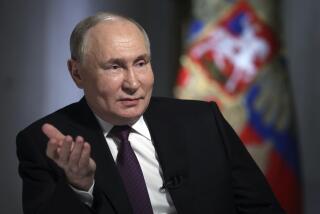Gandhi Mends Fences
- Share via
The Indian subcontinent ranks high on the list of regions where a nuclear arms race would be especially dangerous. It is extremely encouraging that India and Pakistan now recognize the danger and want to talk about it.
Prime Minister Rajiv Gandhi of India and President Zia ul-Haq of Pakistan, both in New York to attend the 40th-anniversary session of the United Nations, had a surprisingly friendly meeting last week. They agreed to immediate talks on bolstering trade, now almost nonexistent, and on means of sealing their border against unauthorized incursions. Of potentially greater importance, they also agreed to hold “technical talks” on how they might reassure one another that their nuclear programs envision peaceful uses.
Both nations insist that they don’t have any nuclear weapons now and have no plans for building any. However, India exploded a nuclear device in 1974 and is considered to be capable of building an atomic arsenal. Pakistan is reliably reported to be in an advanced stage of a nuclear weapons development program--leading India recently to threaten a nuclear arms program of its own.
A nuclear arms race on the Indian subcontinent would represent an appalling misallocation of economic resources, and might trigger nuclear proliferation in the Middle East as well. And, while each side is presumably thinking in terms of deterring the other, there is an obvious danger that, in the event of a conventional war between India and Pakistan, the losing side would use nuclear weapons as a last resort.
The best way to prevent that from happening is for the two countries to stop short of building nuclear weapons while there is time. Working out an arrangement of mutual reassurance is a formidable task, given the history of hostility and conflict since the creation of Pakistan from a partitioned India in 1947. The fact that Gandhi and Zia are willing to try is very good news.
More to Read
Sign up for Essential California
The most important California stories and recommendations in your inbox every morning.
You may occasionally receive promotional content from the Los Angeles Times.













